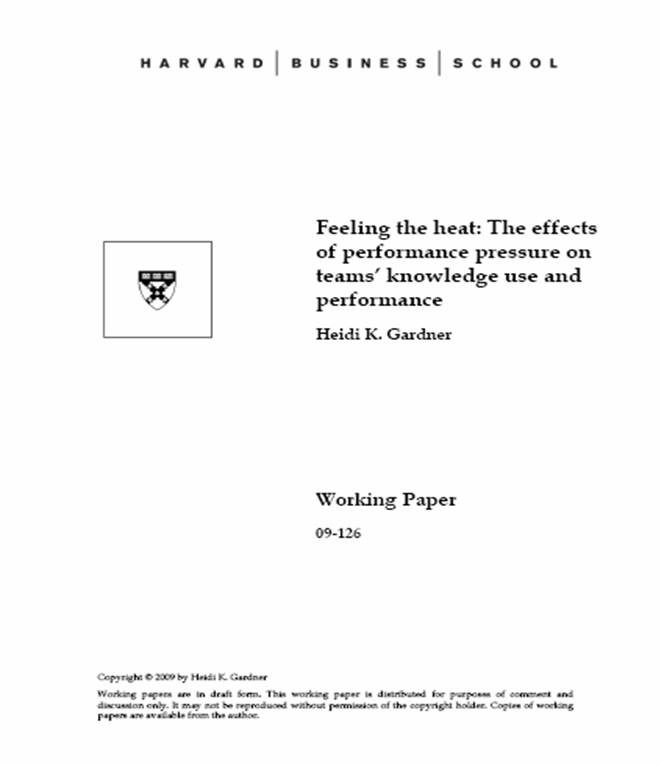In a recent working paper of Harvard Business School, Heidi Gardner suggests that staffing your project with high level performers is necessary but not sufficient to get the job done. Instead of focusing on the mere presence of consultants, the emphasis should be on how well you are using their expertise.
That’s right: we are talking workplace dynamics here; the secret interpersonal ingredient that marks the difference between compliance and performance.
Symptoms
 ‘When will accurate expertise recognition lead to effective utilization?’ Gardner went out to identify and examine the critical factor that influences team members’ willingness and ability to perform. She focused on a sample of 82 accounting and consulting project teams from a Big 4 audit firm.
‘When will accurate expertise recognition lead to effective utilization?’ Gardner went out to identify and examine the critical factor that influences team members’ willingness and ability to perform. She focused on a sample of 82 accounting and consulting project teams from a Big 4 audit firm.
Gardner’s research findings suggest that teams facing performance pressures tend to default to high-status peers at the expense of using team members with deep knowledge of the client, resulting in poor team performance. She concludes by stating that there is a paradox affecting teams’ use of members’ knowledge: ‘the more important the project, the less effective the team’.
This research is a painful reminder of something every consultant knows: the customer would be better of if we wouldn’t be so shortsighted, egocentric and above all: hierarchically conditioned.
For example, Gardner’s research highlights that the extent to which consultants master client-specific expertise is significantly related to customer retention. This includes all the skills and interpersonal relationships that are associated with a particular client and knowledge of the business!
Diagnosis
The trouble is that this deficiency seems to be built in – just like a deficient chromosome of the consulting gene. A consultant needs to be the ‘best individual’ in order to make a good career within a firm. This deficiency, which is instigated by the classic ‘up-or-out’ virus that is commonly known as the ‘one best way’ to manage a professional services firm, works against the dynamic of sharing knowledge among peers and connecting with the customer.
In the end, consultants become exactly the way their companies hire, manage, appraise, reward and develop: smart individuals with an underdeveloped literacy on the level of knowledge sharing and customer involvement – not to mention: a lack of PASSION!
Therapy for the Deficient Consultant Gene
What should consulting companies and customers do in the face of this diagnosis? Using the Michigan model of HRM, this diagnosis is easily translated into a cure.
- Selection: Hire smart consultants, not their ego: Teams that more effectively utilize their members’ general professional expertise will have higher client satisfaction;
- Performance: Make them work hand in hand with the customer: project and team organization matters! Teams that more effectively utilize their members’ client-specific expertise will have higher client satisfaction
- Appraisal and Rewarding: Set performance indicators that measure and reward team performance, community participation and customer retention instead of individual performance or individual certification in any domain.
- Development: It is no secret anymore that being a social architect is valued more and better in terms of customer satisfaction and overall project performance than being the expert. So the investment on the level of learning should be at least as high in consulting skills as in subject matter expertise.
So this is to the classic up-or-out managers that’ are populating the senior ranks of today’s consulting companies: you are so dead! – and my gut feeling says that this working paper is only the beginning of scientific evidence!
________________
Source:
Feeling the heat: The effects of performance pressure on teams’ knowledge use and performance, by Heidi K. Gardner – Working Paper 09-126 – Harvard Business School.
Related articles:
– Music and Management Consulting – September 27th, 2008
– Open Letter To My Colleagues (Incl. Myself) – August 13th, 2007
– One, Two, Three, Seven?! – April 15th, 2008
– 2008 … Highway To Hell – January 5th, 2008


Pingback: Luc’s Thoughts on Organizational Change » Blog Archive » Smart Consultants? (Part 2)()